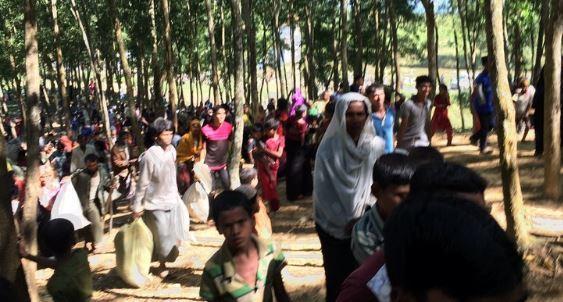Myanmar Government Accused of Ethnic Cleansing of Rohingya Muslims
ASIA--PACIFIC, 26 Dec 2016
Ed Adamczyk | UPI – TRANSCEND Media Service
The human rights group said police are targeting the Rohingya through looting, murder and destruction of homes and mosques.

Amnesty international accused the Myanmar police and military of crimes against humanity in the treatment of their country’s minority Muslim Rohingya population.
Photo courtesy of Amnesty International
19 Dec 2016 – Myanmar’s Muslim Rohingya minority is facing crimes against humanity committed by authorities, Amnesty International warned.
The London-based human rights organization accused Myanmar police and military personnel of murder, torture, rape and looting in a report. It said an operation of ethnic cleansing began after border police were attacked by a militant group largely composed of Rohingya. The army then launched an anti-insurgency operation in late October, and has denied any atrocities, saying instead it is conducting anti-terrorist actions in western Myanmar’s Rakhine province.
Anecdotal evidence obtained through interviews by Amnesty International said random killings, and destruction of property, including the burning of over 1,200 homes, mosques and schools, constitute “a widespread and systematic attack against the Rohingya population in northern Rakhine state and may therefore constitute crimes against humanity.”
The activist group Human Rights Watch has published satellite images of destroyed Rohingya villages. Witnesses told Amnesty International of incidents including helicopter gunships firing randomly at fleeing Rohingya villagers.
“The Burmese military has targeted Rohingya civilians in a callous and systematic campaign of violence,” said Amnesty International’s Rafendi Djamin. “Men, women, children, whole families and entire villages have been attacked and abused, as a form of collective punishment. The deplorable actions of the military could be part of a widespread and systematic attack on a civilian population and may amount to crimes against humanity.”
An estimated 27,000 Rohingya attempted to escape to adjacent Bangladesh in October, straining border communities. Amnesty International accused the Bangladeshi government of turning refugees away at the border. It called on an end to violence and an investigation by the United Nations.
DISCLAIMER: The statements, views and opinions expressed in pieces republished here are solely those of the authors and do not necessarily represent those of TMS. In accordance with title 17 U.S.C. section 107, this material is distributed without profit to those who have expressed a prior interest in receiving the included information for research and educational purposes. TMS has no affiliation whatsoever with the originator of this article nor is TMS endorsed or sponsored by the originator. “GO TO ORIGINAL” links are provided as a convenience to our readers and allow for verification of authenticity. However, as originating pages are often updated by their originating host sites, the versions posted may not match the versions our readers view when clicking the “GO TO ORIGINAL” links. This site contains copyrighted material the use of which has not always been specifically authorized by the copyright owner. We are making such material available in our efforts to advance understanding of environmental, political, human rights, economic, democracy, scientific, and social justice issues, etc. We believe this constitutes a ‘fair use’ of any such copyrighted material as provided for in section 107 of the US Copyright Law. In accordance with Title 17 U.S.C. Section 107, the material on this site is distributed without profit to those who have expressed a prior interest in receiving the included information for research and educational purposes. For more information go to: http://www.law.cornell.edu/uscode/17/107.shtml. If you wish to use copyrighted material from this site for purposes of your own that go beyond ‘fair use’, you must obtain permission from the copyright owner.